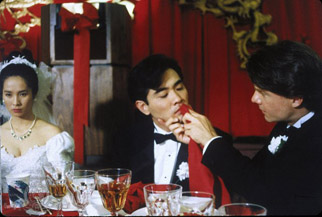Classic Movie Review: The Wedding Banquet
By Edwin Davies
November 26, 2012
After a chance meeting with an old family friend provides them with a venue, Wai-Tung is compelled to agree to a wedding banquet, one complete with hundreds of guests, many of whom feel hurt by not being invited to the wedding itself. Suddenly, the little lie that promised to solve everything snowballs into a huge, all-consuming problem.
Although the film seems to be setting up the banquet as the climax, it actually occurs about halfway through, and proves to be less of a resolution to the story than the catalyst for the film's shift in tone. Everything leading up to the banquet is fairly gentle and genial, whilst the event itself is chaotic and destructive, and everything afterwards winds up being fraught with tension and angst. After the banquet, the masquerade of Wai-Tung and Wei-Wei's marriage begins to fray the relationship between them, as well as Wai-Tung's relationship with Simon, setting up events and emotions that spend the second half threatening to burst through.
It's a change of tone that is incredibly well-executed, and the reason it works is because Lee takes the farcical elements of the story to their breaking point, finding the exact moment at which each character realises that they can't take anymore. The shift from farce to melodrama could have felt awkward and out of place, but it is so deftly handled that the two tones wind up complementing each other; the comedy of the first half introduces all of the characters at their best and makes them likable, so seeing them start to snap at each other actually has a profound impact. At the same time, the whole story is underpinned by a melancholy streak as all of the characters have to lie or be lied to. This means that even the comedy has a solid dramatic bedrock that pays off when the truth threatens to come out.
Yet Lee doesn't let everyone off the hook by wrapping everything up neatly. In the end, the lies that started the story have been replaced by an even more complicated series of lies, but they're ones that the characters are just about comfortable living with. It's a nuanced and satisfying resolution to a deeply compassionate film, one that has sympathy for every single person involved. At the time that he was working on the screenplay, Lee had been unemployed for several years as he tried to find work after film school, and his wife had to support their family during this time. This was considered embarrassing in Taiwanese culture, and whether or not Lee intended the story of The Wedding Banquet to echo his real-life experiences trying to pursue his dream in a way which ran counter to tradition, it's not hard to see how he might have had an affinity with Wai-Tung's situation.
That empathy runs throughout the movie (and is something which can be seen in most of Lee's other films) and is one of the main reasons why The Wedding Baquet resonates so strongly. It's a film that cares about its characters, made by someone who cares. Even as it highlights the differences between members of the same family, it never forgets that they love each other, without ever suggesting that love is necessarily strong enough to overcome those differences. It's a very human film, and as such is as funny and painful as the people who populate it.
Continued:
1
2




